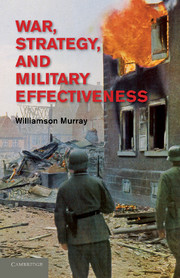Book contents
- Frontmatter
- Contents
- Introduction
- 1 History and the Future
- 2 Thucydides and Clausewitz
- 3 Clausewitz out, Computers in: Military Culture and Technological Hubris
- 4 Changing the Principles of War?
- 5 Military Culture Does Matter
- 6 History and Strategic Planning
- 7 Thoughts on Red Teaming
- 8 The Distant Framework of War
- 9 The Problem of German Military Effectiveness, 1900–1945
- 10 Reflections on the Combined Bomber Offensive
- 11 The Air War in the Gulf
- 12 Thoughts on British Intelligence in World War II and the Implications for Intelligence in the Twenty-First Century
- 13 The Meaning of World War II
- Index
- References
5 - Military Culture Does Matter
Published online by Cambridge University Press: 07 October 2011
- Frontmatter
- Contents
- Introduction
- 1 History and the Future
- 2 Thucydides and Clausewitz
- 3 Clausewitz out, Computers in: Military Culture and Technological Hubris
- 4 Changing the Principles of War?
- 5 Military Culture Does Matter
- 6 History and Strategic Planning
- 7 Thoughts on Red Teaming
- 8 The Distant Framework of War
- 9 The Problem of German Military Effectiveness, 1900–1945
- 10 Reflections on the Combined Bomber Offensive
- 11 The Air War in the Gulf
- 12 Thoughts on British Intelligence in World War II and the Implications for Intelligence in the Twenty-First Century
- 13 The Meaning of World War II
- Index
- References
Summary
Professional military cultures differ greatly from service to service and from nation to nation. Yet, they represent an essential component of military effectiveness. How armies, air forces, marine corps, and navies think about war guides their peacetime innovations and determines the patterns of successful or unsuccessful adaptation of war. The military profession is not only the most demanding physically of the professions, it is also the most demanding mentally. But there is another side that military historians and pundits often exclude from their examinations of military culture. That is the portion of the landscape that deals with the physical, physiological, and psychological preparation of military organizations for war. As the Prussian military theorist, Carl von Clausewitz, suggests: “The end for which a soldier is recruited, clothed, armed, and trained, the whole object of his sleeping, eating, drinking, and marching is simply that he should fight at the right place and the right time.”
War places extraordinary demands on the individual. In effect, military organizations require the soldier to remain on the battlefield in an arena of danger where his enemy aims to kill him. They demand that he maintain himself in an environment in which every human instinct suggests that he should leave immediately. Clausewitz brilliantly depicted that terrifying challenge in On War:
As we approach, the rumble of guns grow louder and alternates with the whir of cannonballs…shots begin to strike close around us. We hurry up the slope.…Here the cannonballs and bursting shells are frequent.…Suddenly someone you know is wounded; then a shell falls among the staff. You notice that some of the officers act a little oddly.…Now we enter the battle raging before us, still more like a spectacle, and join the nearest division commander. Shot is falling like hail, and the thunder of our own guns adds to the din. A noise is heard that is a certain indication of increasing danger – the rattling of grapeshot on roofs and on the ground. Cannonballs tear past, whizzing in all directions, and musketballs begin to whistle around us. A little further we reach the firing line, where the infantry endures the hammering for hours.…The air is filled with hissing bullets that sound like a sharp crack if they pass close to one's head. For a final shock, the sight of men being killed and mutilated moves our pounding hearts to awe and pity.
- Type
- Chapter
- Information
- War, Strategy, and Military Effectiveness , pp. 83 - 97Publisher: Cambridge University PressPrint publication year: 2011



